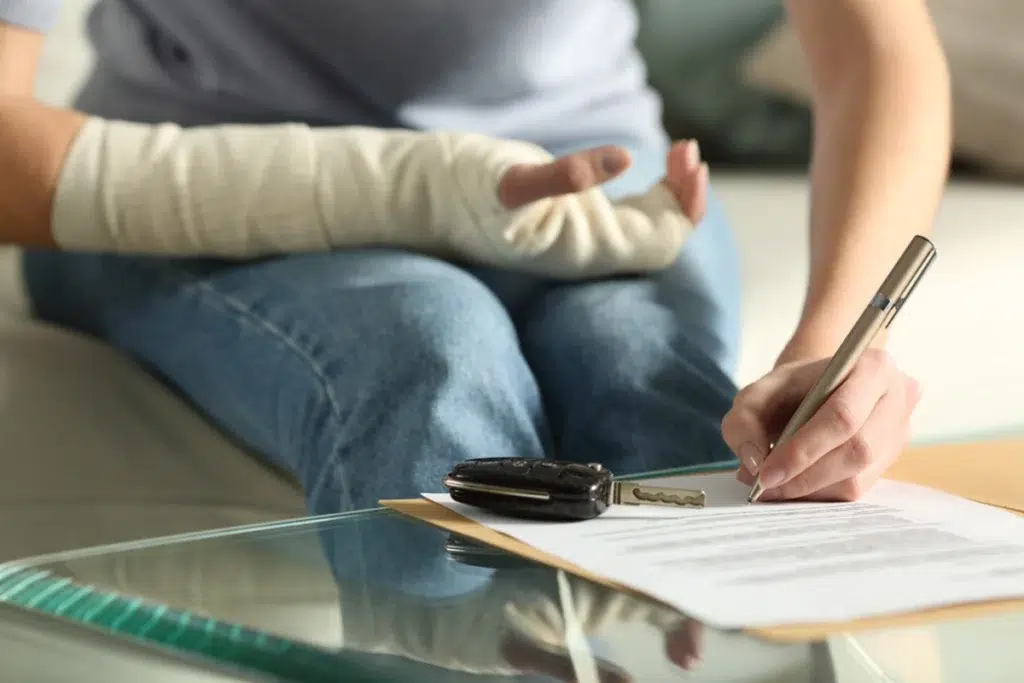
A car accident can change your life in an instant. Whether you’re dealing with physical injuries, emotional trauma, or financial strain, knowing how and when to take legal action is critical. One of the most common questions injury victims have is, “How long after a car accident can I claim injury?” The answer can affect whether you’re eligible for compensation and how much you may receive.
If you’re unsure about your rights after a crash, speaking with an experienced California car accident lawyer at Delfino Green & Green can help ensure you’re protected from the start. Below, we explore everything you need to know about timelines, legal rules, and how to get the most from your car accident claim in California. Our goal is to empower you with the knowledge to confidently manage your personal injury claim and make informed decisions during a challenging time.
To discuss your case and legal options, you can schedule a free consultation with our team—there’s no obligation and no cost to get started.
Claiming An Injury After A Car Accident: The First Steps
After a collision, it’s crucial to understand that time is not on your side. California law provides a limited window to file a lawsuit for injuries caused by a car crash. If you miss this window, you could lose your right to recover compensation, even if your injuries are severe.
But it’s not just about filing quickly—it’s also about filing correctly. Gathering the right documentation, consulting a doctor, notifying your insurance provider, and contacting an injury claim lawyer near you can all impact the outcome. The journey to claiming an injury after a car accident begins at the scene of the crash. The actions you take immediately following the incident can significantly impact the strength of your future claim.
1. Prioritize Safety and Seek Medical Attention: Your health is the top priority. Check yourself and your passengers for injuries. If anyone is hurt, call 911 immediately. Even if you feel fine, it’s vital to get a medical evaluation. Many serious conditions, such as whiplash, concussions, or internal bleeding, have delayed injury symptoms after a car accident that might not appear for hours, days, or even weeks. Seeing a doctor creates a crucial medical record that links your injuries directly to the accident.
2. Report the Accident: In California, you are required to report any accident that results in injury, death, or more than $1,000 in property damage to the DMV within 10 days using an SR-1 form. You should also call the police to the scene so they can create an official accident report. This report is a vital piece of evidence, providing an objective account of the incident.
3. Gather Evidence at the Scene: Gathering evidence at the scene is a crucial step after an accident. If you are physically able, collect as much information as possible.
- Photos and Videos: Take pictures of the accident scene, vehicle damage, road conditions, traffic signals, and any visible injuries. Preserving physical evidence, such as damaged vehicle parts or debris, is essential to support your claim and establish fault.
- Contact Information: Exchange names, contact details, driver’s license numbers, and insurance information with the other driver(s).
- Witness Statements: If there are witnesses, get their names and contact information. Their testimony can be invaluable.
- Note-Taking: Write down everything you remember about the accident, including the time, date, location, and sequence of events.
It is important to claim immediately to preserve your legal rights and comply with all reporting deadlines.
Understanding what to do is the first step. The next is knowing when you need to do it.
What Happens If You Wait Too Long to Claim Injury?
Waiting too long can cost you everything. If you file a claim after the statute of limitations expires:
- Your claim may be dismissed outright
- You could lose the right to compensation
- Insurance companies may deny your case automatically
To protect your rights, it is crucial to file your claim promptly and avoid missing important legal deadlines.
Even if your injuries are valid and well-documented, missing the deadline usually voids your legal right to recover damages. The limitations begin running from the date of the accident or from when the injury is discovered, depending on the specific circumstances of your case.
Delayed Injury Symptoms After a Car Accident
Some injuries, like whiplash or traumatic brain injuries, don’t show symptoms until days or weeks after the crash. This delay can complicate your case—but it doesn’t mean you’re out of options.
California’s discovery rule may allow you to file later if you can prove that the injury wasn’t discoverable right away. To strengthen your case:
- Seek medical attention immediately, even if you feel fine
- Follow up with your doctor if symptoms arise later
- Keep all records and diagnostic reports
Understanding your need for future treatment can help ensure your claim covers all potential medical expenses.
Acting quickly once symptoms appear can make a difference in whether your claim is accepted.
Understanding the Car Accident Statute of Limitations in California
One of the most critical factors in any personal injury case is the statute of limitations. The applicable statute determines the time limit for filing legal claims after an auto accident. This is a state law that sets a strict time limit on your right to file a lawsuit. If you miss this deadline, you will likely lose your legal right to seek compensation for your injuries forever.
So, how long do you have to report an injury and file a claim? For most personal injury claims in California, the statute of limitations for a car accident is two years from the date of the accident. This means you have two years from the day the crash occurred (the accident date) to file a formal lawsuit in court. Statutes of limitations can vary depending on the type of personal injury case and the parties involved.
While this may seem like a long time, it can pass quickly, especially when you are focused on medical treatments, vehicle repairs, and recovering from your trauma. It’s crucial to understand a few key nuances of this rule:
- Property Damage vs. Personal Injury: The two-year deadline applies specifically to filing a personal injury lawsuit related to a car accident case. If you are only seeking compensation for damage to your vehicle or other property, the time limit is different. In California, you have three years from the date of the accident to file a claim for property damage. Car accident claims for property damage have a different statute of limitations.
- Claims Against Government Entities: If your accident involved a government vehicle or was caused by a dangerous condition on public property (like a poorly maintained road), the rules are much stricter. The California Government Code sets out special rules and deadlines for filing lawsuits against government agencies. You typically have only six months to file a formal claim with the responsible government agency.
Your insurance policy may require prompt notification to the insurance carrier after the accident date to preserve your right to coverage.
After considering these deadlines, it is important to understand California’s statute of limitations, including exceptions for persons lacking mental capacity or wrongful death claims. Legal claims for medical malpractice have different statutes of limitations than car accident lawsuits.
What happens if you wait too long to claim an injury?
Simply put, the court will almost certainly dismiss your case. Failing to file a legal claim on time can result in losing the right to recover non-economic damages and medical bills. The insurance company for the at-fault party will have no legal obligation to negotiate or offer a settlement. This is why understanding the personal injury claim deadline in California is not just important—it’s essential. Significant injuries and serious injuries may require the assistance of a personal injury lawyer to ensure all damages are properly claimed. Personal injury cases involving mental capacity issues may have extended deadlines. The accident date is the starting point for most statutes of limitations, but exceptions may apply.
The Discovery Rule: An Exception to the Deadline
While the statute of limitations for a car accident in California is generally firm, there is a significant exception known as the “discovery rule.” This rule can extend the filing deadline in specific situations.
The discovery rule states that the two-year clock does not begin to run until the date you knew, or reasonably should have known, that you had been injured. This is particularly relevant for cases involving delayed injury symptoms after a car accident.
For example, you might walk away from a crash feeling only slightly sore, attributing it to the jolt of the impact. Months later, you begin experiencing chronic back pain and, after consulting a doctor, discover you have a herniated disc that was directly caused by the accident. In this scenario, the “discovery date” could be the day the doctor diagnosed your condition, not the day of the accident.
However, invoking the discovery rule can be complex. The opposing insurance company will likely argue that you should have discovered the injury sooner. They may claim that a reasonable person would have sought more thorough medical attention immediately.
A skilled attorney can gather the necessary medical evidence and expert testimony to successfully argue that the discovery rule applies to your case, protecting your right to pursue a claim even if the initial two-year period has passed. Consulting a personal injury attorney is crucial to ensure all legal deadlines and exceptions are properly addressed and your rights are fully protected.
Auto Insurance and Car Accidents: The Claims Process
After an accident, you will be dealing with at least one insurance company—yours and likely the other driver’s. It is crucial to report the accident to your own insurer promptly, as required by your policy. However, when dealing with the at-fault driver’s insurance company, caution is key.
The other driver’s insurance adjuster may contact you shortly after the crash. They may seem friendly and helpful, but their goal is to resolve the claim for as little money as possible. Be wary of:
- Requesting a Recorded Statement: You are not obligated to provide a recorded statement to the other party’s insurer. They can use your words against you later. It’s best to let your attorney handle these communications.
- Offering a Quick, Lowball Settlement: They may offer a fast payment before the full extent of your injuries is known. Accepting this offer will require you to waive your right to any future compensation for this incident.
- Requesting a Broad Medical Authorization: Do not sign any documents without your attorney’s review. They may ask for access to your entire medical history to find pre-existing conditions they can use to deny or devalue your claim.
Your attorney will manage the entire insurance claims process, submitting a detailed demand letter that outlines the facts of the case, establishes liability, and documents the full scope of your damages.
The Car Accident Settlement Process Timeline
Understanding the car accident settlement process timeline can help manage expectations. While some straightforward cases settle in a few months, more complex ones can take over a year or longer, especially if a lawsuit is necessary.
- Initial Consultation and Investigation (Weeks to Months): Your lawyer gathers evidence, and you focus on medical treatment.
- Demand Letter and Negotiation (1-3 Months): Once you reach Maximum Medical Improvement (MMI), your attorney sends a demand package to the insurer. This kicks off negotiations.
- Filing a Lawsuit (If Necessary): If negotiations stall, your attorney will file a lawsuit before the statute of limitations expires.
- Discovery Phase of Lawsuit (6 Months to a Year+): Both sides exchange information through depositions, interrogatories, and requests for documents.
- Mediation and Settlement or Trial (Months): Many cases settle during the discovery phase or at mediation. If not, the case proceeds to trial, where a judge or jury will decide the outcome.
Don’t Wait: Work with an Experienced Car Accident Lawyer
The period after a car accident is critical. The insurance companies start building their case against you from day one, which is why you need a professional on your side immediately. What happens if you wait too long to claim injury is not just a legal question—it’s a financial one. Delays can lead to lost evidence, missed deadlines, and a significantly reduced or denied claim.
If you or a loved one has been injured in a car accident, do not hesitate. Your primary focus should be on your physical and emotional recovery. Let a dedicated legal team handle the complexities of your claim.
Contacting an experienced car accident attorney at Delfino Green & Green is your most important next step. We can help you understand the specific time limits that apply to your situation, navigate the discovery rule if you have delayed injuries, and fight to get the most from your car crash claim in California. We offer a free, no-obligation consultation to discuss your case and explain how we can protect your rights and pursue the maximum compensation you deserve. Don’t let the clock run out on your right to justice.
Disclaimer: This content is for informational purposes only and does not constitute legal advice. For personalized legal assistance, please contact Delfino Green & Green directly.



